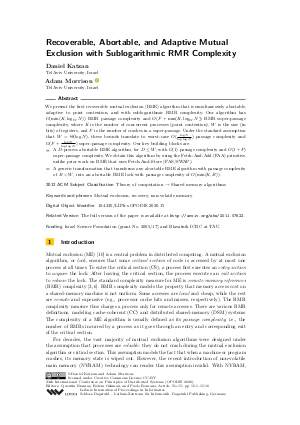Recoverable, Abortable, and Adaptive Mutual Exclusion with Sublogarithmic RMR Complexity
Authors
Daniel Katzan,
Adam Morrison 
-
Part of:
Volume:
24th International Conference on Principles of Distributed Systems (OPODIS 2020)
Part of: Series: Leibniz International Proceedings in Informatics (LIPIcs)
Part of: Conference: International Conference on Principles of Distributed Systems (OPODIS) - License:
 Creative Commons Attribution 3.0 Unported license
Creative Commons Attribution 3.0 Unported license
- Publication Date: 2021-01-25
File

PDF
LIPIcs.OPODIS.2020.15.pdf
- Filesize: 0.53 MB
- 16 pages
Document Identifiers
Related Versions
-
The full version of the paper is available at http://arxiv.org/abs/2011.07622.
Subject Classification
ACM Subject Classification
- Theory of computation → Shared memory algorithms
Keywords
- Mutual exclusion
- recovery
- non-volatile memory
Metrics
- Access Statistics
-
Total Accesses (updated on a weekly basis)
0Document
0Metadata
Abstract
We present the first recoverable mutual exclusion (RME) algorithm that is simultaneously abortable, adaptive to point contention, and with sublogarithmic RMR complexity. Our algorithm has O(min(K,log_W N)) RMR passage complexity and O(F + min(K,log_W N)) RMR super-passage complexity, where K is the number of concurrent processes (point contention), W is the size (in bits) of registers, and F is the number of crashes in a super-passage. Under the standard assumption that W = Θ(log N), these bounds translate to worst-case O((log N)/(log log N)) passage complexity and O(F + (log N)/(log log N)) super-passage complexity. Our key building blocks are: - A D-process abortable RME algorithm, for D ≤ W, with O(1) passage complexity and O(1+F) super-passage complexity. We obtain this algorithm by using the Fetch-And-Add (FAA) primitive, unlike prior work on RME that uses Fetch-And-Store (FAS/SWAP). - A generic transformation that transforms any abortable RME algorithm with passage complexity of B < W, into an abortable RME lock with passage complexity of O(min(K,B)).
Cite As Get BibTex
Daniel Katzan and Adam Morrison. Recoverable, Abortable, and Adaptive Mutual Exclusion with Sublogarithmic RMR Complexity. In 24th International Conference on Principles of Distributed Systems (OPODIS 2020). Leibniz International Proceedings in Informatics (LIPIcs), Volume 184, pp. 15:1-15:16, Schloss Dagstuhl – Leibniz-Zentrum für Informatik (2021)
https://doi.org/10.4230/LIPIcs.OPODIS.2020.15
BibTex
@InProceedings{katzan_et_al:LIPIcs.OPODIS.2020.15,
author = {Katzan, Daniel and Morrison, Adam},
title = {{Recoverable, Abortable, and Adaptive Mutual Exclusion with Sublogarithmic RMR Complexity}},
booktitle = {24th International Conference on Principles of Distributed Systems (OPODIS 2020)},
pages = {15:1--15:16},
series = {Leibniz International Proceedings in Informatics (LIPIcs)},
ISBN = {978-3-95977-176-4},
ISSN = {1868-8969},
year = {2021},
volume = {184},
editor = {Bramas, Quentin and Oshman, Rotem and Romano, Paolo},
publisher = {Schloss Dagstuhl -- Leibniz-Zentrum f{\"u}r Informatik},
address = {Dagstuhl, Germany},
URL = {https://drops.dagstuhl.de/entities/document/10.4230/LIPIcs.OPODIS.2020.15},
URN = {urn:nbn:de:0030-drops-135004},
doi = {10.4230/LIPIcs.OPODIS.2020.15},
annote = {Keywords: Mutual exclusion, recovery, non-volatile memory}
}
Author Details
Funding
Israel Science Foundation (grant No. 2005/17) and Blavatnik ICRC at TAU.
References
-
Y. Afek, H. Attiya, A. Fouren, G. Stupp, and D. Touitou. Long-Lived Renaming Made Adaptive. In PODC, 1999.

-
A. Alon and A. Morrison. Deterministic Abortable Mutual Exclusion with Sublogarithmic Adaptive RMR Complexity. In PODC, 2018.

-
J.H. Anderson and Y.J. Kim. An Improved Lower Bound for the Time Complexity of Mutual Exclusion. Distributed Computing, 15(4), 2002.

-
H. Attiya. Adapting to Point Contention with Long-Lived Safe Agreement. In SIROCCO, 2006.

-
H. Attiya and A. Fouren. Algorithms Adapting to Point Contention. JACM, 50(4), 2003.

-
H. Attiya, D. Hendler, and P. Woelfel. Tight RMR Lower Bounds for Mutual Exclusion and Other Problems. In STOC, 2008.

-
D.Y.C. Chan and P. Woelfel. Recoverable Mutual Exclusion with Constant Amortized RMR Complexity from Standard Primitives. In PODC, 2020.

-
T.S. Craig. Building FIFO and Priority-Queuing Spin Locks from Atomic Swap, 1993.

-
S. Dhoked and N. Mittal. An Adaptive Approach to Recoverable Mutual Exclusion. In PODC, 2020.

-
E.W. Dijkstra. Solution of a Problem in Concurrent Programming Control. CACM, 8(9), 1965.

-
W. Golab and D. Hendler. Recoverable Mutual Exclusion in Sub-Logarithmic Time. In PODC, 2017.

-
W. Golab and D. Hendler. Recoverable Mutual Exclusion Under System-Wide Failures. In PODC, 2018.

-
W. Golab and A. Ramaraju. Recoverable Mutual Exclusion: [Extended Abstract]. In PODC, 2016.

-
W. Golab and A. Ramaraju. Recoverable Mutual Exclusion. Distributed Computing, 32(6), 2019.

-
P. Jayanti. F-Arrays: Implementation and Applications. In PODC, 2002.

-
P. Jayanti. Adaptive and Efficient Abortable Mutual Exclusion. In PODC, 2003.

-
P. Jayanti and S. Jayanti. Constant Amortized RMR Abortable Mutex for CC and DSM. In PODC, 2019.

-
P. Jayanti, S. Jayanti, and A. Joshi. A Recoverable Mutex Algorithm with Sub-Logarithmic RMR on Both CC and DSM. In PODC, 2019.

-
P. Jayanti, S.V. Jayanti, and A. Joshi. Optimal Recoverable Mutual Exclusion Using only FASAS. In NETYS, 2018.

-
P. Jayanti and A. Joshi. Recoverable FCFS Mutual Exclusion with Wait-Free Recovery. In DISC, 2017.

-
P. Jayanti and A. Joshi. Recoverable Mutual Exclusion with Abortability. In NETYS, 2019.

- Daniel Katzan and Adam Morrison. Recoverable, Abortable, and Adaptive Mutual Exclusion with Sublogarithmic RMR Complexity. CoRR, 2020. URL: http://arxiv.org/abs/2011.07622.
-
J.M. Mellor-Crummey and M.L. Scott. Algorithms for Scalable Synchronization on Shared-Memory Multiprocessors. TOCS, 9(1), 1991.

-
M. M. Michael. Hazard pointers: safe memory reclamation for lock-free objects. TPDS, 15(6), 2004.

-
M.L. Scott. Non-blocking Timeout in Scalable Queue-based Spin Locks. In PODC, 2002.

-
M.L. Scott and W.N. Scherer. Scalable Queue-based Spin Locks with Timeout. In PPoPP, 2001.

-
Gadi Taubenfeld. Synchronization algorithms and concurrent programming. Pearson / Prentice Hall, 2006.

-
J.H. Yang and J.H. Anderson. A fast, scalable mutual exclusion algorithm. Distributed Computing, 9(1), 1995.

